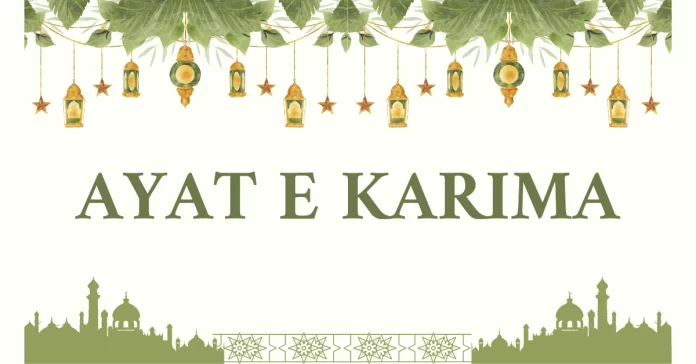Introduction to Ayat E Karima
Ayat e Karima, also known as the heartfelt supplication of Prophet Yunus (Jonah, peace be upon him), holds profound significance in Islamic teachings. This powerful dua, found in the Quran, is a beacon of hope for those seeking Allah’s forgiveness, mercy, and assistance during times of distress.
Derived from Surah Al-Anbiya, Verse 87, Ayat e Karima has been a source of solace for Muslims worldwide. Let’s delve into the Ayat e Karima in Arabic, its transliteration, English translation, its context in Hadith, and the myriad benefits it offers.
Ayat E Karima in Arabic
The blessed ayat is written as:
لَّا إِلَهَ إِلََا أَنْتَ سُبْحَنَكَ إِنِّي كُنْتُ مِنَ الْظَّالِمِينَ
Ayat Karima Transliteration
The correct transliteration of this beautiful dua is:
La ilaha illa anta subhanaka inni kuntu minaz zalimin.
Ayat E Karima in English
In English, the verse translates to:
“None has the right to be worshipped except You; Glory be unto You. Indeed, I have been among the wrongdoers.”
Ayat Kareema in Hadith
The immense virtues of Ayat e Karima are highlighted in several Hadiths. Consider the following:
- Sa’d bin Abi Waqqas (may Allah be pleased with him) reported: The Messenger of Allah (peace be upon him) said, “The supplication of Yunus when he called upon Allah inside the belly of the whale was this: ‘There is no God but You; Glory be to You; I have been among the wrongdoers.’ A Muslim never recites this for any need without Allah responding to them.” (Source: Sunan al-Tirmidhi, 3505)
- Another narration states: “None who is experiencing difficulty recites this dua except that Allah will relieve them of their hardship.” (Ahmad and at-Tirmidhi, classified as authentic)
The Story Behind Ayat E Karima
Prophet Yunus (peace be upon him), also known as Dhun-Noon, was sent to guide his people toward the worship of Allah alone. Despite his sincere efforts, they rejected his message.
In frustration, Yunus supplicated for their punishment and left them. However, Allah commanded him to remain patient and continue preaching. When the punishment loomed, his people repented sincerely, and Allah forgave them, displaying His infinite mercy.
Meanwhile, Yunus boarded a ship that encountered a severe storm. Lots were cast to identify who was responsible for the calamity, and Yunus was chosen. Reluctantly, he was thrown into the sea, where a massive whale swallowed him. In the darkness of the whale’s belly, Yunus realized his mistake and cried out with these heartfelt words:
“La ilaha illa anta subhanaka inni kuntu minaz zalimin.”
Moved by his sincerity, Allah accepted his plea, and the whale released him. Yunus returned to his people, who welcomed him, and they all embraced Allah’s guidance.
Four Key Aspects of Ayat E Karima
Ayat e Karima is a comprehensive supplication that embodies:
- At-Tawheed (Oneness of Allah): The phrase “Laa Ilaha Illa Anta” affirms that none deserves worship except Allah.
- Glorification of Allah: “Subhanaka” absolves Allah of any imperfections, elevating His Majesty.
- Acknowledgment of Human Shortcomings: “Inni kuntu minaz zalimin” is a confession of one’s mistakes and a plea for forgiveness.
- Complete Dependence on Allah: It signifies ultimate servitude and reliance on the Creator, who alone can deliver relief.
Benefits of Reciting Ayat E Karima
The recitation of Ayat e Karima offers numerous blessings and spiritual benefits, including:
- Forgiveness of Sins: Recognizing one’s mistakes leads to divine pardon.
- Relief from Hardships: A powerful remedy for distress, anxiety, and sadness.
- Increased Faith: Strengthens one’s belief and connection with Allah.
- Protection from Afflictions: Shields against calamities and trials.
- Guidance and Wisdom: Illuminates the path of righteousness.
- Attaining Allah’s Mercy: A means of invoking Allah’s compassion and blessings.
Practical Usage of Ayat E Karima
- Daily Recitation: Incorporating this dua into your daily prayers can bring immense peace and blessings.
- During Hardships: Call upon Allah with sincerity, trusting His mercy and power.
- For Forgiveness: Use it as a means to seek pardon for your mistakes.
Conclusion
Ayat e Karima is not merely a supplication; it is a profound declaration of faith, humility, and reliance on Allah. Its recitation reminds us of Allah’s infinite mercy and the boundless hope He offers to His servants.
As you incorporate Ayat e Karima into your life, let it be a reminder of Allah’s compassion and the transformative power of sincere repentance. May this blessed supplication bring light to your heart and ease to your soul.

